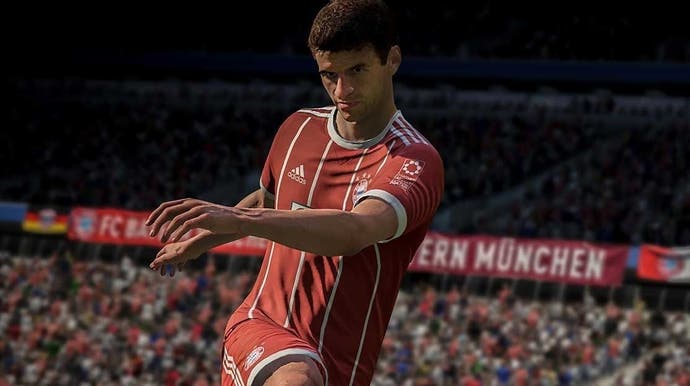FIFA's greatest obstacles? Thomas Müller, ugly football, and you
Mbappé to front.
As of last Sunday the 2019/20 football season, pickled and zombified beyond its natural expiry, finally came to an end. Off the back of some alarmingly frantic games in the latter stages, the Champions League final promised box-to-box drama and defensive chaos, but ultimately played out exactly as all Champions League finals often do: two hours of nervy, methodical human chess, resulting in Bayern Munich's cranking mechanical stiflement of the gold-plated Paris Saint-Germain.
The talisman of that great Bavarian mechanism was inevitable, at least to those who follow football. Thomas Müller, despite being an attacker and despite not scoring, was central to Bayern's plan, harrying and nibbling at PSG when out of possession and tugging and twisting their defence when his team had it. Now 30, Müller is emblematic of Bayern Munich and the German national team's near-perpetual success over the past decade.
He's also, famously, a bit of a footballing enigma. A contradiction of a player who seems to scuff his way impossibly through games, all elbows and knees and loose-fitting shin pads. His success at the weekend, being a success of the most Thomas Müller kind, reminded me of an article in ESPN about the great obstacle his awkwardness tends to propose for a particular football game: by FIFA's standards, one of the best players in one of the world's best teams is, technically, not very good.
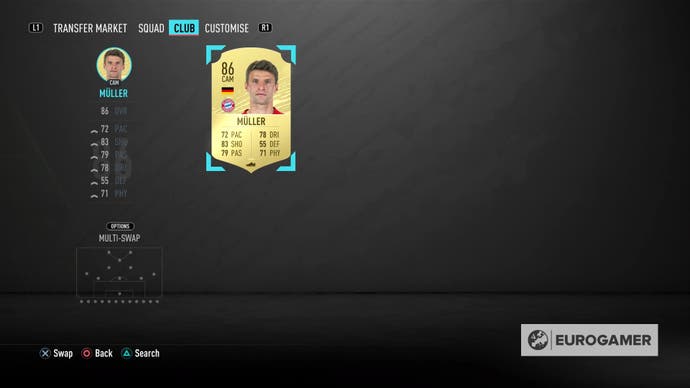
Speaking to ESPN for that article in 2017, Michael Mueller-Moehring, the man in charge of the scouting system that helps decide FIFA's in-game player ratings, dug into it a bit. Müller "isn't good at anything, really, apart from his positioning," Mueller-Moehring explained, rather boldly. "He always finds the right spot on the pitch, it's amazing. But he's not a great dribbler and he can't really strike the ball properly - his finishing is sometimes really, really off. Shot power is not his strength as well... So if you rate Thomas Muller properly, he ends up with a rating that we say doesn't make sense. It's too low."
The solution in FIFA, ultimately, is fudging it. The article concludes: "So what does EA Sports do to correct a case like Müller? They subjectively boost his overall rating to reflect his standing in the game." Before you grab the pitchforks and shout corruption, mind, overall rating doesn't actually impact anything in FIFA matches - it's all in the individual stats that the overall is usually derived from - but still, in this case it's just a good illustration of the where EA Sports gets things wrong, or at least where it's unfortunately forced to get things wrong. Rather than finding a way to make players like Müller stand out in the game, excelling in their own way, the studio puts an empty number on him that effectively tells uninformed players he's good, when in practise he simply isn't.
It sounds minor - how many Müllers can there be, anyway? - but when you're making a game about real things, what you choose to include and exclude all counts towards a kind of resulting, philosophical statement. It's what shows your hand, telling people what you value and what you don't, or what you think players should and shouldn't value themselves (the clue is in Mueller-Moehring's use of the word "properly"). In this case, EA Sports says you should value players who are physically powerful (Adama Traoré, Daniel James), or technically powerful (Toni Kroos, Juan Mata), or ideally, both (Cristiano Ronaldo, Kylian Mbappé, Neymar, and dozens of "Special" cards in FIFA Ultimate Team). And that's all.
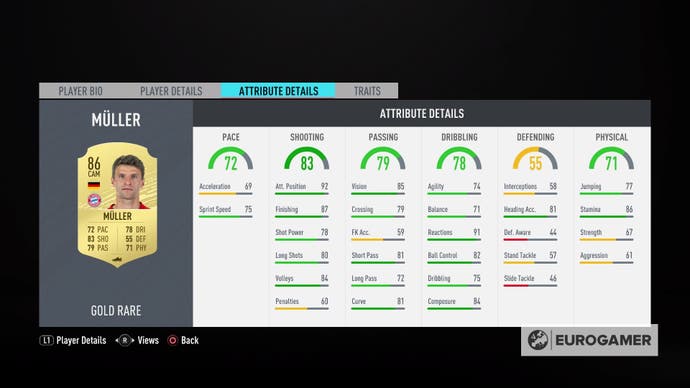
This needn't necessarily be a problem for football games. It's avoidable, especially as any Football Manager fans, who have likely been screaming at the entirety of this article until now, will tell you. In Football Manager, player stats are split into three categories: Technical, Mental, and Physical, broadly the same as FIFA's are. The difference of course is how they're used. Football Manager being Football Manager, you don't actually do the playing. Broadly speaking it's hands-on and involved to the extreme until you reach the match, at which point all you can do is lay out your little toy soldiers, wind them up, and hope they do what they were told (and that what you told them was a good idea).
In Football Manager's case, Thomas Müller is really very good. He has some of the best Mental attributes of anyone in the game (and there are a lot of players in the game, for what it's worth: over 100,000, to FIFA's 18,000). Specifically Müller excels at what we armchair analysts down the pub would call "footballing intelligence": his Anticipation, Composure, Concentration, Decisions, and Off the Ball movement are all between 16 and 20 - 20 being the maximum rating possible. More personal mental attributes, like Aggression, Bravery, Determination, Teamwork and Work Rate are just as high. By footballing standards, Müller's a genius.
In Football Manager it means that, while Müller's not going to pick the ball up on the halfway line and dribble through a mass of defenders any time soon, or ping a spectacular pass across the pitch, he'll be more likely than almost any player to do the right thing, in the right place, at the right time. One example: spending the Champions League final nullifying the technically superlative Neymar and later bursting into the box, precisely laying off the ball, falling over, then immediately getting up to make a run and pull defenders out of position - all while his teammate actually scores.
Back to FIFA, and what's really the problem here? Well, partially it's you. In FIFA someone's holding the controller, which means Thomas Müller only makes good decisions if you make good decisions for him and is why Gary Neville's criticism of David Luiz, of catastrophic Brazilian defeat to Germany at the World Cup fame, as playing like a 10-year-old on a PlayStation was so deliciously withering.
If anything, actually, in FIFA the most mentally brilliant players are occasionally the worst to play with - their excellent positioning might put them somewhere that's useful by the game's standards but terrible for how you're trying to play. Or, if you think it's not just a kind of inverse placebo effect, some people reckon you might pick a pass and feel as though you've been somehow overridden, the in-game player interpreting the vagueness of the analogue stick's direction and opting to go for the tricker, technically more perceptive one of the nearest two passes you could have meant, but actually throwing you off your rhythm, the game feeling like a kind of aggressive predictive text, or assisted aim (but again, maybe you're just imagining that). And these are only if there's any impact at all. It's often hard to tell, given how little emphasis a match of FIFA places on the tactical side of football, and how some of the mental attributes that are rated in-game are actually only used when the player's on the AI's team, and you're not involved.
So, what can EA Sports do? Two things, in my opinion. The first is the big one and the tricky one, which in a way you can't blame the developer for avoiding. If it wants to actually represent football, FIFA needs to place more in-match emphasis on the off-the-ball things that players do. That's hard, because FIFA is fundamentally a game that trades on the idea that you are in charge, the fantasy not just of controlling the player but really being them. It's massive not because football is massive, but because the desire to be a professional footballer is massive.
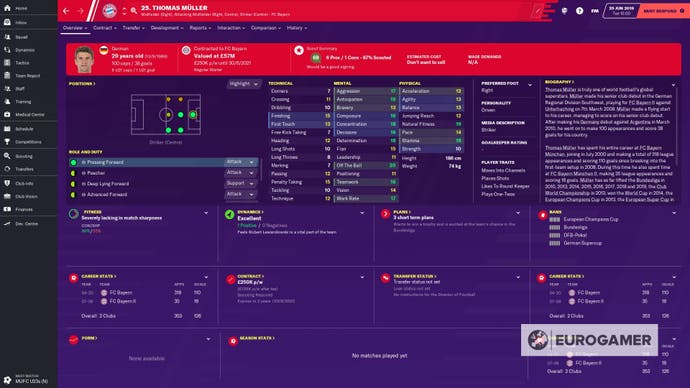
Only, that's not entirely right. FIFA might present itself as being about being the player, and EA Sports may or may not believe that, but really what I think people love about playing it is the fantasy of controlling a team as a whole - otherwise we'd all be playing that Be A Pro mode, or the on-the-pitch perspective of The Journey, as opposed to the standard format where you're constantly rotating between control of different individual players on your side. It's a hybrid, as it currently stands, between making holistic decisions (such as setting up your team to play a short passing game in the relatively shallow tactics menu) and holistically impactful decisions (such as choosing, on a moment-to-moment basis, to play the shorter of two available passes when each player has the ball, each time the choice arises).
What EA Sports could do, to do itself a favour and move the game on from the yearly pendulum swings between chaotic off-the-ball movement (FIFA 19) and the statuesque (FIFA 20), is place greater emphasis on the mental attribute ratings of the players in how that off-the-ball movement plays out. So, as I approach the PSG box with Leon Goretzka, playing as Bayern Munich in my nice recreation of the 2020 Champions League final, Thomas Müller might make an actually intelligent run - so good that it still pulls PSG's Thiago Silva out of position, despite his own excellent stats for defensive positioning - and space opens up for me to thread a through ball to another forward or drive on myself and shoot. (If you're thinking of suggesting FIFA already does this - it does not. Watch some footage of FIFA 20 back and count the number of your team's players who are making runs off the ball at any given time, without you hammering the "Make A Run" button to get, at best, one singular player moving first.)
That said, as much as it's easy for me to sit here and explain without any real behind-the-scenes knowledge of how FIFA's players decide when and where to move about on the pitch, I'm sure it's not as easy to really put into practise. Strike it off as a casualty of tightly annualised deadlines and the resulting risk-aversion, if you like, and let's accept that doing something like this would be gambling with the mega-successful formula. What's less excusable is the lack of progress towards a second option: a matter of precision, which should in theory be simpler and shouldn't, really, be something FIFA has an excuse to ignore.
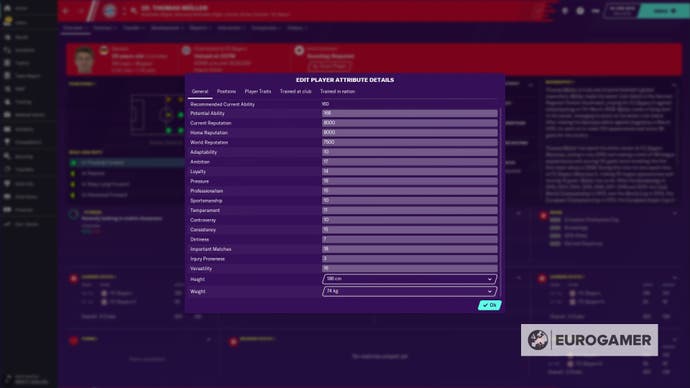
Compared to the obvious football-replicating rivals like Football Manager, the attributes that do exist in FIFA are extraordinarily imprecise, even excluding the mental ones entirely. Sticking to our pal Thomas, and using Mueller-Moehring's own example, think about Shooting, Finishing, and Technique. In FIFA, you have just Shooting and Shot Power which govern a player's ability to score goals from close to medium range. So going back to the problem with Müller and how "he can't really strike the ball properly," how "his finishing is sometimes really, really off" and "shot power is not his strength as well," the problem in FIFA is there's no "proper" way to accommodate for the fact that Müller scores a decent amount of goals despite regularly fluffing his actual shots (at the highest level, the Champions League, he's scored a more than respectable four goals in seven starts).
So, in FIFA, Müller gets an oddly high Shooting stat (85 out of 100, enough for plenty of screaming, top-corner swaz) and a distorted overall rating to make up for it. In Football Manager, however, there are more stats that govern a player's ability to score goals. There's Finishing, which is effectively the Football Manager term for Shooting, but there's also Technique, described in-game as the "aesthetic quality" of a player's performance, as in: how cleanly do they strike a ball; how close can Thomas Müller reliably get to the Platonic ideal of the perfect shot on goal? That alone solves a lot of the surface-level Müller problem, but there's also Composure, which governs how likely players are to bottle it in one-on-ones and high-pressure scenarios, and Concentration that affects how much moment-to-moment focus they have on consistently pulling off what they're attempting, and, if we're really digging around under the hood, Football Manager has some hidden stats like Pressure, Big Matches, and Consistency, which determine how likely they are to perform when under wider expectations, in big games, and on a regular basis. The killer instinct Müller irrefutably has.
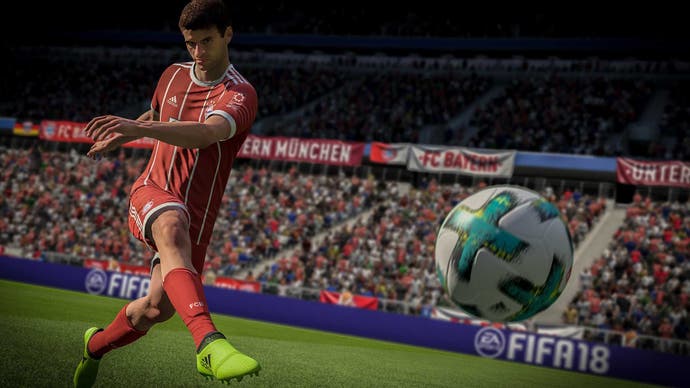
In Football Manager then, let's look at the stats. Müller gets a good Finishing stat (15 out of 20, the equivalent of 75 in FIFA), and a relatively low rating for Technique (12 out of 20, the equivalent of 60 if it were in FIFA), and as mentioned above largely exceptional ratings for all of the others. The result: he scores big goals, in big games, in high-pressure moments, but those goals are almost universally ugly.
Granted, Football Manager's systemic depth goes way beyond what FIFA would ever need to because it's a sim, and because you play as the one who sees the systems instead of the one who's completely inside of them. The comparison is almost wholly unfair - almost - and it's not really the point. It's best thought of as an illustration of the wider question: why does one football game seem to get so close to capturing not just the aesthetic look and feel of football but the spirit of it - the absurdities and oddities and the footballing contradictions, like Müller, that make it beautiful - and the other find it impossible? Why is there one game that looks tailor-made for players like Müller and the other that almost resents the fact that one of this generation's finest players even exists?
The answer fits rather nicely with the result of that Champions League final between Bayern Munich and PSG - in the differences of opinion on what the game's about, between the obviously pretty players and the awkwardly efficient. More plainly, it's not Müller that's the problem; it's what you choose to prioritise at the heart of the game. Maybe it's a little facile to put it like this, especially given this year's cover, but FIFA could do with a little more emphasis on the beautiful ugliness of Bayern Munich, and a little less on the stars of PSG.
